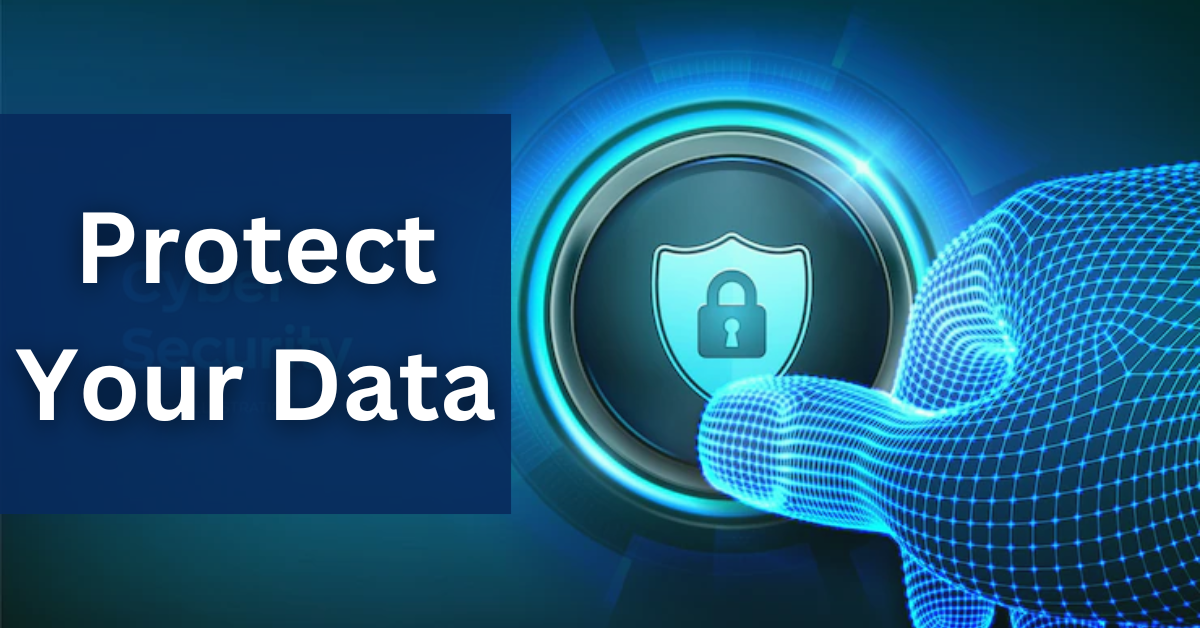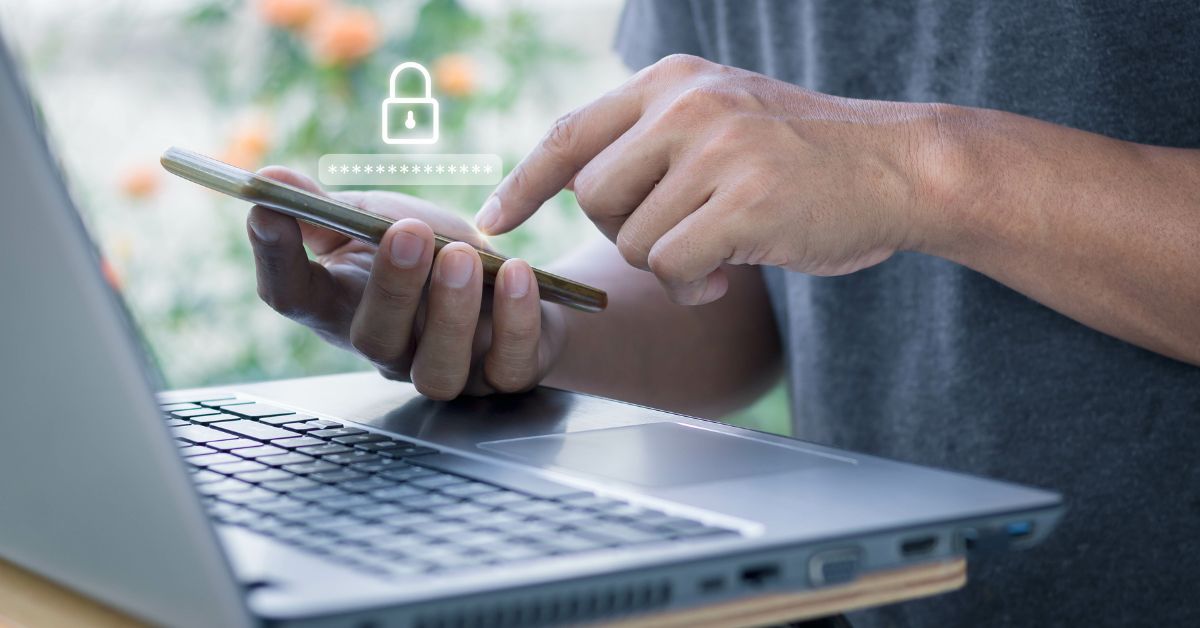How Can You Protect Your Data Working From Home?

Small businesses that work from home often have to deal with the risk of cybersecurity:
- They are more likely to not have an IT department.
- Their employees may lack security software awareness or not use proper access control measures.
- There may be unprotected, sensitive customer data on company servers.
Cybersecurity training and security updates are essential to keep work devices safe.
This article will provide tips on protecting your company’s data on personal devices or work devices while working from home. We’ll cover everything from setting strong passwords to using a VPN. Follow these tips, and you’ll be able to stay safe and productive while working from home.
Why Remote Employees Must Prioritize Data Security Software
Entrepreneurs are always looking for ways to save money and increase efficiency in their businesses. Working from home can be a great perk, but it also comes with some risks.
One of the most significant risks is data security. When employees are working remotely, they may not be protected by the same security measures that are in place at a traditional office. It is more important than ever for remote employees to prioritize data security software.
Top Security Risks While Working Remotely
As more people work from home, there are increased cybersecurity risks to be aware of. Here are some of the most common risks while working from home.
Hackers
Hackers typically use various methods to access a system, including social engineering, password cracking and exploiting software vulnerabilities. They may also use denial-of-service attacks to interfere with legitimate users’ access to the operating system.
Once a hacker accesses a system, they can use various techniques to take control of the system and access your business data. They may install malicious software that allows them to control the system remotely. They may also modify system files or configuration settings to enable them to gain further access or privileges.
Regardless of their motivation, hackers can pose a severe threat to the security of computer systems.
Malware and viruses
Malware is a type of software that is created to harm or disable computers. Malware can be spread through an internet connection, email attachments, websites and infected files. Once installed on a system, malware can allow hackers to access and take control.
Malware can be used for various purposes, including stealing information, launching attacks against other systems and damaging or deleting files. Malware can also be used to create botnets, which are networks of computers that hackers control.
Phishing Scams
Phishing scams are created to fool users into revealing confidential information like passwords or credit card numbers. They typically involve an email or website that appears to be from a legitimate source. The email or website will often contain links that lead to a fraudulent website where the user is asked to enter their personal information.
These scams can be complicated to detect, as they often use legitimate-looking logos and branding. Additionally, scammers may use personal information that they have gathered about the company resources to make the scam more convincing.
Unsecured Public Networks
Unsecured Wi-Fi networks are a common target for hackers, as they can access a victim’s operating systems. Hackers can use many methods to exploit unsecured Wi-Fi networks, including wardriving. Once they have gained access to a network, they can then use it to launch attacks against computers or devices connected to the network.
Unsecured Wi-Fi networks are a risk because they allow anyone within range of the network to connect to it. This means that if a hacker can access an unsecured Wi-Fi network, they can potentially access any computer or device connected to the network.
Data Breach
A data breach is a security incident that occurs when unauthorized individuals access or steal sensitive or confidential information. Data breaches can occur through various means, including hacking, social engineering, and accidental disclosure. Once the information has been accessed or stolen, it can be used for identity theft, fraud or other malicious purposes.
Data breaches can significantly impact the company’s data organization. Data leaks can result in reputation damage, financial losses and liability.
Outdated Software
Outdated software is a typical security risk. For hackers, it becomes easy to access sensitive data, as it can be exploited to access a victim’s computer or device. Hackers will often search for known vulnerabilities in software that has not been updated and then use these vulnerabilities to launch attacks. Once they have access to a system, they can install malware or steal sensitive information.
Outdated software is a risk because it may contain security vulnerabilities that have not been patched. This means that if a hacker can exploit a vulnerability, they can access a system or steal sensitive information.
Security Tips For Remote Workers To Protect Data
There are several home security tips that remote workers can use to protect their personal devices. Here are some tips:
Use a VPN (Virtual Private Network)
A way to keep your data private on a personal device is to use a VPN. A VPN (Virtual Private Network) encrypts and re-routes your traffic through a server in another location. This makes it much harder for anyone to snoop on your sensitive data or track your online activity.
Use Multi-factor Authentication
Two-factor authentication is an extra layer of security that can be used to make your company data secure. With it, you will need to provide a second factor, such as a code from your personal device, to log in. By doing this, you make it more complicated for hackers to access your account—even if they have your password.
Don’t Click on Suspicious Links
Another way to protect all your data is to be careful about the links you click. Hackers often use links to redirect you to malicious websites that can infect your computer with malware. If you’re ever unsure about a link, hover over it with your mouse to see where it will take you before you click on it.
Use Strong Passwords
The first step in protecting your data is to create strong passwords. Avoid using easily guessed words or phrases, and don’t use the same password for each account. A password manager is a great way to keep track of all your passwords. We recommend using two-factor authentication whenever possible to help protect your account information.
Be Aware of Public Wi-Fi:
When working from home, it’s tempting to take advantage of public Wi-Fi network hotspots. Don’t connect your work computer to any public internet connection. These hotspots are often insecure, and it’s easy for someone to intercept your data while you’re connected. If you must use a public network, connect to a VPN first.
Backup Regularly
One important thing you can do to protect your company data is to back up your files regularly. This way, if your computer is ever lost or stolen, you’ll be able to recover your data from the backup. We recommend backing up your data to an external hard drive or a cloud storage service to keep your data at hand.
Use Security Tools
There are a number of security tools that can be used to protect your devices and data. These tools include antivirus software, firewalls and intrusion detection systems.
Protect Personal Devices
Finally, it’s important to protect your personal devices as well. Laptops and mobile devices often contain sensitive data, so keeping them safe is important. Be sure to lock your mobile devices with fingerprint recognition when you’re not using them, and never leave them unsecured in public.
There are many things that employees working remotely can do to protect their data. These tips include using strong passwords, being careful about the links you click and keeping your software up to date. The article also recommends backing up your data regularly and using security tools to protect your devices. Finally, the report advises against sharing your login credentials with anyone and reminds readers to keep their personal devices safe.


